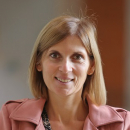The master's program « Econometrics, Statistics - Data Science for Social Sciences » aims to give the students intending to pursue advanced professional careers or doctoral research a solid culture in economics and statistics, as well as in various related fields of applied mathematics.
- The first year of the international track « Data Science for Social Sciences » offers compulsory general courses in theoretical economics, econometrics, mathematical statistics and statistical software for data scientists, as well as optional specialization courses in mathematics and their applications such as, for instance, finance, data bases, optimization, Markov chains, martingales theory, probability modeling, and big data.
- The second year of this master emphasizes advanced and applied techniques in data science, statistics and econometrics. It offers deeper courses in data science, particularly in mathematics of machine and deep learning algorithms, data mining, big data, regulation of data spreading and data protection, as well as specialized courses in different fields of application of statistics to social sciences, such as spatial statistics and econometrics, graph theory and graph analytics, geomarketing, scoring, and web mining. Moreover, this second year of the program offers higher level courses of statistical software, namely R, Python and SAS, and of massive databases management. The different courses allow students to acquire versatile skills in the processing of complex data (panel, survey, survival, graph, spatial) with modern parametric, non-parametric, and learning statistical methods.
Apprenticeship
For prospective students interested in more on-the-job experience, the program can be adapted to allow following an apprenticeship (alternance) alongside the master's degree. From September to March, apprentices spend 3 days at the university (M-T-W) and 2 days in the company (Th-F). From April to August, they mainly work in the company.
Program 2024-2025
M1 "Econometrics, Statistics" - Data Science for Social Sciences - International track
(syllabi are regularly updated)
SEMESTER 1 |
SEMESTER 2 |
|---|---|
|
Compulsory courses:
2 electives from 6: |
Compulsory courses:
4 electives from 8: |
|
End of August refresher courses - Math Camp:
|
Internship or Master Thesis* |
* UE1/UE2/UE5: A minimum grade of 10 out of 20 is required.
** Masters 2 Directors recommend attending certain options:
- ’Times series’: M2 Statistics and Econometrics
- Corporate Finance and Market Finance: M2 Finance
- Time Series: M2 EEE
*** Math camp for M1 and M2 students
Bonus point
To practice a sport or a musical activity within the University orchestra, or the participation in the module "professional life" during the year can give you bonus points. Only points above 10/20 are recorded.
Program 2024-2025
M2 "Econometrics, Statistics" - Data Science for Social Sciences - International track
(syllabi are regularly updated)
SEMESTER 3 |
SEMESTER 4 |
1 among 3 :
Non-Mandatory:
|
|
** Students who have attended the Professional Development/Coaching course in 2023/24 are exempted
*** Maths refreshers courses for 1st and 2nd year master students
****Groups of 4 students
(i) Students who have attended Project Management in M1 cannot register in M2. And (i) Depending on the compatibility of the schedule
- Internship: duration typically of 6 months graded on the basis of the internship report and of the oral defense.
- Tutored projects: (a) the Statistical Consulting course (4 students per group) is a project proposed by a company and supervised by 2 teachers/researchers, with a report to be delivered to the client before the final defense; (b) collective projects (2 to 4 students per group) for several courses (e.g., Survey sampling, Non-parametric models, and Spatial Econometrics) supervised by a teacher, with a final oral defense.
- Master thesis (alternative option to the internship): topic of your choice, or suggested by a tutor, supervised by a teacher or a researcher, with a final oral defense in M2 and without defense in M1.
The second year of this master also exists as an apprenticeship track, with some differences such as courses during holidays periods.
Apprenticeship track
SEMESTER 3 |
SEMESTER 4 |
Non-Mandatory:
|
Activity Report
|
** Students who have attended the Professional Development/Coaching course in 2023/24 are exempted
*** Maths refreshers courses for 1st and 2nd year master students
Bonus point
Practicing a sport or a musical activity within the University orchestra during the year can give you bonus points. Only points above 10/20 are taken into account.
At TSE, learning is enhanced by guest speakers, most of whom are professionals from various industries. These experts bring practical experience and real-world insights, complementing the teachings of our academic professors. This synergy provides students with a well-rounded education rooted in both theory and professional practice.
Semester 1, master 2
- Raquel ALCARAZ SERNA, Scoring 3
- Joseph GERGAUD, Statistical software Julia
- Sylvia Gil Casals, Mathematics of Machine and Deep Learning Algorithms + Data mining
- Stéphane Malkawi, Statistical consulting
- Jean-Philippe Navarro, Statistical Consulting
- Louis Olive Scoring/Introduction to Python
- Adil Zoutine, Mathematics of Machine and Deep Learning Algorithms
Semester 2, master 2
- Raphaël Danjou, Datanomics
- Nicolas Le Gall, Big data
- Van Duy NGO, Data bases
- Marion Hoffman, Graph analysis
- Marijn Keuzer, Graph analysis
- Lynda Lechani, Web mining
- Stéphane Malkawi, Statistical consulting
- Jean-Philippe Navarro, Statistical Consulting
- Louis Olive Scoring/Introduction to Python
- Rémi Périchon, Big Data
- Claire Vaufrey, Project management
This international track aims to train "data scientists", "data analysts", "project managers", "engineers” and/or “consultants" in statistics with backgrounds in economics and econometrics. The graduates benefit from direct professional integration not only in the tertiary sector (e.g. quantitative marketing, banking, insurance), but also in industry and academic research.
First year - Acceptance criteria and enrollment
Students with an undergraduate degree who majored in Economics or Economics and Mathematics at the Toulouse School of Economics, and who are able to justify a good English level, are eligible to enroll in the M1 program "Data Science for Social Sciences", international track entirely taught in English.
- Or by application review:
Students with an undergraduate degree in an economics or mathematics field;
French or foreign students with a degree and credits considered equivalent, and who are able to justify a good English level as well as a good Mathematics Level (GRE required for foreign students).
Second year - Acceptance criteria and enrollment
Students majored in the M1 program "Data Science for Social Sciences" are eligible to enroll in the M2 program.
- Or by application review:
Holders of a master's degree in an economics or mathematics field;
French or foreign students with a degree and credits considered equivalent, and who are able to justify a good English level as well as a good Mathematics Level (GRE required for foreign students).
Application:
To apply to this master, select on the eCandidatures platform:
- First year: M1 Econometrics, Statistics - Data science for social sciences International track
- Second year: M2 Econometrics, Statistics - Data science for social sciences International track
For more details about requirement documents and application process, please see the Admission section.
Apprendiceship track: If you wish to follow this program on apprendiceship track, click HERE.
For Enrollment and Fees, please see the Admission section.
Scholarships: Some Master scholarships will be awarded to Master students according to academic and individual criteria, see Admission section
Chat with our students!
Don't hesitate to contact our student ambassadors if you have any questions for them! They will be happy to share their experience with you. Explore the different student ambassador profiles displayed below and create your account to start the discussion...
Not all fields of study are represented, but feel free to submit your question to one of the ambassadors by level of study.



